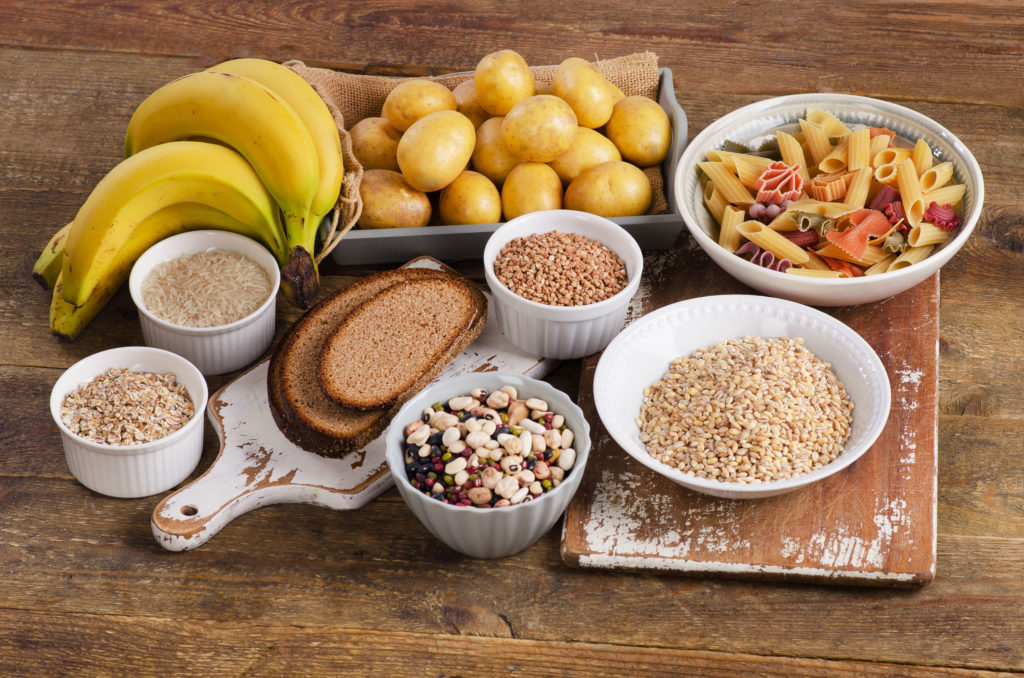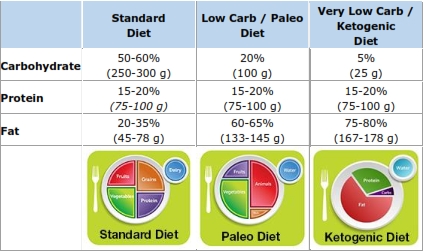
In my last post on diet and cancer we talked about the concerns with Sugar. We discussed the importance of choosing low glycemic carbohydrates and always balancing carbohydrates with good quality protein and healthy fat. We also discussed a bit about why fruit is still healthy for you even though too much sugar is not.
In this post I want to take the question even further and rather than just focus on sugar, look at all sources of carbohydrates. Although researchers continue to investigate the benefits of a low carbohydrate diet on cancer prevention, there is accumulating evidence that restricting carbohydrates could enhance cancer treatment, inhibit tumor growth, extend survival, and reduce the risk of cancer development.
Sources of Carbohydrate
First, let’s make sure everyone knows what foods contain the most carbohydrates. Many are displayed in the picture above.
Grains: wheat, barley, rye, quinoa, rice, oats, spelt, kamut, farro, couscous, etc.
Products Made From Grains: bread, pasta, tortillas, crackers, cakes, cookies, etc.
Starchy Vegetable: potatoes, corn, yams, butternut squash, pumpkin, etc.
Fruit: all fruit (fresh, frozen, or dried)
Legumes: beans, peas, lentils, soy
What Is Low Carbohydrate
There is no standard definition for low carbohydrate. It’s rather subjective depending on who you are talking to. To help you understand it better, I’ve categorized it into 3 different levels: moderate, low, and very low.
Standard: A standard recommendation from the Academy of Nutrition and Dietetics is to consume between 50-60% of total calories per day from carbohydrates. For a 2,000 calorie-per-day diet, 50-60% of carbohydrates is equivalent to 250-300 grams of carbohydrates per day.
Moderate: If we accept this as standard, then I would consider an intake between 40%-20% carbohydrates per day (200-100 grams) to be moderate. And I actually find this level to be appropriate for many of the clients I work with, whether we are working on weight management, blood sugar management, or disease prevention.
Low: Once your intake drops to 20% carbohydrates per day (100 grams) or less this would be considered low. Most Paleo diets hover around 100 grams of carb per day. In my experience, at this level, weight loss will occur more rapidly and blood sugars will drop even lower. Some research suggests that you would start to receive cancer risk reduction at this point. This could be a very realistic and safe level to aim for.
Very Low: However, most of the research around carbohydrates and cancer is actually looking at very low carbohydrate diets. These are diets that cause nutritional ketosis. Nutritional ketosis is a controlled, insulin regulated process which results in a mild release of fatty acids and ketone body production in response to either a fast from food, or a reduction in carbohydrate intake. This differs from Diabetic Ketoacidosis, which is driven by a lack of insulin in the body. Without insulin, blood sugar rises to high levels and stored fat streams from fat cells. This excess amount of fat metabolism results in the production of abnormal quantities of ketones. The combination of high blood sugar and high ketone levels can upset the normal acid/base balance in the blood and become dangerous.
Very low carbohydrate diets are also known as Ketogenic Diets. Probably the most well known ketogenic diet commercially is the Atkins Diet. In order for someone to enter and stay in ketosis the carbohydrates usually have to stay around 25 grams per day; that would be equivalent to only 5% of total caloric intake per day.
If you notice, in the table below, as carbohydrates drop, calories are replaced with fat, and protein intake ideally stays the same. As more of your calories come from fat, the types of fat you choose become very important.

Source: UCSF Osher Center Cancer Nutrition Website
Let’s Look At The Research
Cancer:
Most of the studies thus far have been based on animal research. However, there are many clinical trials currently underway looking at the benefit in humans of following a very low carbohydrate, or ketogenic, diet. The results have been promising both in animals and humans.
The way research goes however there is going to need to be quite a bit more human evidence before you start seeing ketogenic diets being recommended in the hospital. For now, though, the safety evidence is good and for many people it could be a helpful adjunct to their cancer treatment.
If you are interested in reading more about the research I would encourage you to look through the article I helped write for the UCSF Osher Center. If you are currently undergoing cancer treatment or recently completed treatment and are looking at ways to reduce your risk for progression or recurrence I would seriously consider adopting a low or very low carb diet under the guidance of an Integrative Dietitian with experience in this area. Please contact me to schedule a free planning session if you’d like to explore a ketogenic diet further.
Weight Loss & More:
There have also been many studies looking at Low Carbohydrate Diets for weight loss. Studies have shown that under conditions of carbohydrate restriction, fuel sources shift from glucose and fatty acids to fatty acids and ketones. This shift leads to appetite reduction, weight loss, and improvement in markers of cardiovascular disease. (source)
Another study showed that even when carbohydrates are replaced with fat, participants still lost intra-abdominal fat and improved insulin sensitivity. There are many more studies out there showing similar results. Science Daily has a nice list of additional studies you can peruse if interested in reading more on this topic.
Besides weight loss, improving cardiovascular and blood sugar markers, and cancer prevention, low carbohydrate diets have also been used extensively to treat epilepsy; especially in children who are unresponsive to medications. Researchers are also looking more closely at the benefit of low carbohydrate diets and the treatment of other neurological conditions such as Autism, Alzheimer’s and Parkinson’s. So far the research does look promising. I’m sure we will be seeing more and more recommendations emerge in this area as time goes on.
5 Steps To Low Carb
If you are interested in pursuing a lower carbohydrate diet, whether for cancer prevention, weight loss, or other reasons I would suggest the following steps to help you get there. Even if it proves impossible for you to stick with a very low carb (ketogenic) diet, every step you take to lower your carb intake will improve your health, help you lose weight, and reduce your risks for cancer.
Step 1: Track your current intake to get a sense of how many carbohydrates you normally eat. A tracker like MyFitnessPal can be very helpful in assessing your current intake.
Step 2: Refer to my blog post on Sugar and Cancer and work on reducing your intake of added sugars and high glycemic carbohydrates while focusing more on good quality protein, healthy fats, and lots of veggies at each meal.
Step 3: Using your daily tracker gradually reduce your carbohydrate intake to a first goal of 100 grams per day. If you’re usual intake is closer to 300 grams per day, then you may want to make your first goal be 200 grams per day. Sustain this level for at least 2 weeks before you try reducing further. 100 grams per day could be a very appropriate and healthy long-term level for many people.
Step 4: If it’s not as challenging as you thought it would be to stay around 100 grams per day, next try reducing your intake between 50-100 grams and see if you can sustain this amount for at least 2 weeks. Keep in mind that at this level your source of carbohydrates will be limited to non-starchy vegetables with minimal amounts of fruit.
Step 5: If you really want to try to reduce your intake below 50 grams, which would be consistent with a ketogenic diet, I strongly encourage you to only do this under the supervision of an Integrative Dietitian or other qualified medical practitioner.
Take Home Message
Low glycemic carbohydrates (vegetables, fruits, whole grains, legumes) are an important part of a healthy diet. As we’ve discussed in previous posts on the Rustic Diet a variety of colorful carbohydrates are health promoting, anti-inflammatory, and disease preventing. It may not be appropriate for everyone to limit their carbohydrates beyond that of a moderate intake (100-200 grams per day).
If however you are facing cancer or are obese and struggling to lose weight, then following a low carbohydrate diet could be very helpful. You can safely transition your diet to lower carb by following the steps I outlined above. And for additional support schedule a free planning session.
